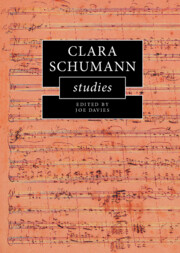Book contents
- Clara Schumann Studies
- Cambridge Composer Studies
- Clara Schumann Studies
- Copyright page
- Dedication
- Contents
- Figures
- Tables
- Music Examples
- Contributors
- Acknowledgements
- Introduction: Clara Schumann in the Musicological Imagination
- 1 Clara and Robert Schumann’s Circles in Dresden
- 2 Disillusionment and Patriotism
- 3 Softened, Smudged, Erased
- 4 A Way with Words
- 5 Clara Schumann and the Nineteenth-Century Piano Concerto
- 6 Clara Schumann and Bach
- 7 Formal Innovation and Virtuosity in Clara Schumann’s Piano Trio in G minor, Op. 17
- 8 Contextualizing Clara Schumann’s Romanzen
- 9 The Young Prophetess in Performance
- 10 Clara Schumann’s Compositional and Concertizing Strategies, and Robert Schumann’s Piano Sets
- 11 Clara: Robert’s Posthumous Androgyne
- 12 Clara Schumann, ‘Clara Schumann’ and the American Press
- 13 Clara Schumann’s Legacy As a Teacher
- Select Bibliography
- Index
1 - Clara and Robert Schumann’s Circles in Dresden
‘I take the liberty to request from you an invitation … to your musical matinée’1
Published online by Cambridge University Press: 25 November 2021
- Clara Schumann Studies
- Cambridge Composer Studies
- Clara Schumann Studies
- Copyright page
- Dedication
- Contents
- Figures
- Tables
- Music Examples
- Contributors
- Acknowledgements
- Introduction: Clara Schumann in the Musicological Imagination
- 1 Clara and Robert Schumann’s Circles in Dresden
- 2 Disillusionment and Patriotism
- 3 Softened, Smudged, Erased
- 4 A Way with Words
- 5 Clara Schumann and the Nineteenth-Century Piano Concerto
- 6 Clara Schumann and Bach
- 7 Formal Innovation and Virtuosity in Clara Schumann’s Piano Trio in G minor, Op. 17
- 8 Contextualizing Clara Schumann’s Romanzen
- 9 The Young Prophetess in Performance
- 10 Clara Schumann’s Compositional and Concertizing Strategies, and Robert Schumann’s Piano Sets
- 11 Clara: Robert’s Posthumous Androgyne
- 12 Clara Schumann, ‘Clara Schumann’ and the American Press
- 13 Clara Schumann’s Legacy As a Teacher
- Select Bibliography
- Index
Summary
Clara and Robert Schumann moved to Dresden in 1844, and resided there until 1850. Little is known about their social life in Dresden, although Schumann scholars have refuted both the notion of Dresden as a culturally underdeveloped town and the perception that Clara and Robert lacked artistic innovation during their residency there. Indeed, they initiated and participated in a number of spontaneous private visits, meals, soirées, organized musical circles, matinees and trios in their own or friends’ homes; walks and outings in the countryside; sociable visits to restaurants and coffee houses; and public events. All these served the shared purpose, albeit in different forms, of communication about and through music. By illuminating facets of the Schumanns’ private and semi-public life in Dresden from the perspective of interpersonal communication, this chapter offers insights into how Clara and Robert Schumann communicated with their contemporaries through physical meetings, letters, visual components (such as drawings and lines of poetry) in album leaves, and musical material, together with a discussion of how these communications influenced their artistic outlook. In doing so, the chapter sheds light on the blurred boundaries between private, semi-private and public domains, especially as these levels of communication were merged in the Schumanns’ lives.
- Type
- Chapter
- Information
- Clara Schumann Studies , pp. 13 - 31Publisher: Cambridge University PressPrint publication year: 2021



